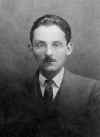Quite apart from his isolation within his family, Kafka also felt isolated from the rest of society. He was a German speaker in a country where the majority of the population spoke Czech - although there is some evidence that he managed to learn Czech. Being Jewish separated him both from the Czech population and from the German gentile community; however, his involvement in the Jewish religion was less than total, so it is not clear that he even found companionship with his fellow Jews.
The influence of Kafka’s tyrannical father stayed with him throughout his life. At school, he was timid and obedient, but was also academically successful. He was educated at the Altstädter Staatsgymnasium, an academically demanding school for the brightest students of the city. Although he went along with the traditional and very orthodox teaching, inwardly he rebelled: this rebellion took its first tangible form when, during his adolescence, he announced that he was both an atheist and a socialist. His support for socialism continued throughout his life.
Despite this isolation, Kafka made friends with a number of German-Jewish intellectuals. One of these, Max Brod, eventually became the major promoter and interpreter of his work, and his most significant biographer.
Max Brod (Click for full-sized image) |





